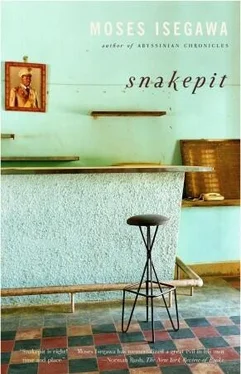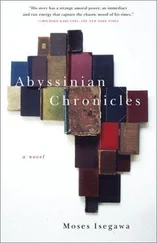“Are you blaming the government for this?”
“The government is doing a very good job. It is the factories; they closed down.”
The General found himself tongue-tied, and he stormed out to save face.
At the next trading centre, with a line of flat-faced shops with porches, he could bear it no longer. As soon as he heard the same dirge, he rushed into the back of the empty shop, kicking aside jerrycans and boxes. Miraculously, he found there bags of sugar, salt, tins of cooking oil, cartons of beans. .
“Hoarding! You are sabotaging the government by hoarding goods and keeping the prices up,” he shouted at the top of his voice, as if he wanted the whole country to hear.
The man, wearing a faded blue shirt with sleeves rolled to the elbows, old-fashioned stove-pipe trousers and bathroom sandals, said nothing; neither did he look impressed.
General Bazooka wanted to call the people of the town together and cane the man in public before selling his stock at government prices. But when he asked the man who he was, he turned out to be the father of a friendly general. In fact, the shop was registered in the general’s name. General Bazooka was mortified. He ordered his men to take a few kilos of whatever they wanted and marched back to his jeep. Yes, he was in the north, this huge sweeping area peopled by so many tribes lumped together under the term “northerner.” He felt detached from the terminology and from the people. The connection seemed to have broken when he left for the south. The language of his dreams and ambitions did not flourish in this soil. The shallowness of his solidarity with these people shocked him. He was irritated by the stifling heat, the thinning vegetation, the luxuries of the city he had left behind.
“It is a bloody desert out here,” he told his men. They shook their heads, as if to say he had been corrupted by the south, for they were glad to be back, to travel through the land of their fondest memories.
The farther he went, the more convinced he became that the journey was a mistake. I should have gone to visit my mother instead of coming here, he said to himself. He could get no coherent picture here, only fragments. The whole country seemed about to fall to pieces. To the north-east, the Karamojong were busy with their cattle-herding, raiding neighbouring tribes as far as the Kenyan border. If these guys wanted cattle, they took the war all the way down to the east, laying waste hundreds of kilometres if necessary. For many of them Kenya was just an extension of Uganda, and they crossed over the border, firing their guns and arrows till they got cattle or defeat.
Guns proliferated in the region, making cattle-rustling a lethal explosion of internecine warfare. The gun had risen to become a symbol of manhood, an integral part of the culture. Many soldiers had sold their guns for cash in this region. He felt angry that this had been allowed to happen. The result was that most parts of Karamoja were no-go areas. The people did what they wanted. Police, army, the taxman; nobody dared go there. The place was the toughest spot in the country.
The more he neared his home area, the place where he was born, the more impatient he grew. He regretted having left his helicopter behind. He had seen enough on the ground for a lifetime. This place would have looked better from the air, less challenging, flattened to blandness by the science of flight. I would not have had to see those haggard cows, he thought, at least not in detail. I came here on holiday, not on a fault-finding mission. I am not a fucking vet or the Minister of Agriculture and Animal Husbandry. Where did those little black pigs come from? They are so small they look like rabbits. The pathetic goats look no better. They seem to be blaming people for keeping them alive.
He got on the radio; he wanted his Mirage Avenger sent immediately. There was no connection. He tried to call the nearest barracks, seventy kilometres away, and also failed. He suddenly felt stranded. What the hell was going on if a general was not assured of a working radio? What if something happened to his family? It looked like a trap which might have been set by Reptile.
In the West Nile District, he felt calm again. He was among his tribesmen. He realized how little the government had done for the area despite the promises made almost every day: there was no electricity; there were few schools and hospitals; there was a dearth of drinking water. The most visible change was that young people wore bell-bottom trousers and silver sunglasses, and dreamed of going south to work for the State Research Bureau.
In the evenings, he had meetings with a number of chiefs. He promised them cattle, cars, mansions, helicopters if they encouraged young men to join the army. He wanted to have men in the army who looked up to him, men he could trust. He could employ them as his personal bodyguard, a sort of personal army within the army to fight for him. He knew that his promises were hollow, but they were the currency a leader spent in order to get certain things done.
He missed being able to indulge his rage, the blazing urge to dominate, which he felt in the south. There was no kick in it here. Spitting beer at these people would only look and feel foolish. Shitting his pants would simply be pathetic. The south did things to him the north didn’t. The biggest part of him was down there; without it, he felt out of balance. It came to him that power was a very atmospheric liquor; where you drank it mattered most. Feeling lost, he decided to go and see his mother.
At Jinja his mother was very glad to see him. She had a big house among trees not far from the lake. She cooked him big meals, went with him for walks and showed him around. She liked the town, with its spacious roads, large houses, the nice weather. She really loved doing business, talking to customers, visiting local ones to see how her fish nets performed. She took him to visit her circle of friends, old ladies in their sixties and seventies. They met every week to drink tea and spend lazy afternoons talking about the past. He did not pay attention to what they said but liked the fact that they treated his mother with great respect. On the way home, she reminded him to bring the children to stay with her when the city became dangerous.
“It is so quiet here. It feels like another world. We spend weeks without hearing anybody shooting. The commanding officer of the barracks is extremely strict. Soldiers don’t fool around. I wish they could transfer you here. We would spend weekends together boating, eating, talking, watching the children grow.”
“It sounds so idyllic, Mother. It is all I ever wanted for you. I will send the children more often. It is not easy to get a transfer. They need me elsewhere.”
“It will break my heart to leave this town.”
“Nobody is going to make you leave this town. The government is in control. You don’t have to worry about anything. You talk as if the government were going to fall tomorrow.”
“When you grow old, you start to worry. So many memories. I see your father sometimes.”
“Is he still drinking?” he said, laughing.
“He seems calmer now.”
“Maybe he doesn’t have the money to buy booze.”
“Stop making cheap jokes about the dead.”
“No offence, Mother.”
GENERAL BAZOOKA LEFT feeling invigorated, spoiling for a fight. A prince back from travel had to show that he was again in residence, in total control. But his men were still being held by Ashes. So he called him and arranged a meeting to break the deadlock. He would gladly have carved him up like a grease-dripping chicken on a spit, but that would have to wait.
The two men met on the third floor of the Parliament Building, overlooking part of the city, which seemed laid down at their feet. There was no small talk. Ashes, a Havana smouldering in his hand like a gun, laid his cards on the table. He wanted Bat freed within twenty-four hours.
Читать дальше











